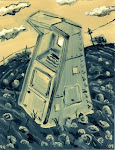 |
| "A fancy, a chimera in my brain, troubles me in my prayer"—John Donne |
Now whole towns and villages are beginning to yank their deposits from your holdings. Your thick skin may barely feel the pinch but this must register as a buzz in your ear. Testing—Testing—are we, are they, is anyone getting through? My constant refrain, the one I’ve shared with you over an imaginary pint, in a Starbucks over your non-existent latte, through numerous letters, is that you are out of touch and lack sensitivity. This has only worked to your best interests up until now. If you are without feeling and train your eye only on the growth of your portfolio you might miss the boat, the one that is emptying out your vaults—I know, I know, a grand, unrealistic vision—people with teaspoons, even townships with buckets, can hardly effect the oceans of lucre, the google of green, upon which your many dubious institutions float. I say your, but you know me. You represent many things to many people. You may be my personal financial advisor but you are also a chimera, defined by the Miriam-Webster as:
CHIMERA—
1: a fire-breathing she-monster in Greek mythology having a lion's head, a goat's body, and a serpent's tail b : an imaginary monster compounded of incongruous parts
2: an illusion or fabrication of the mind; especially : an unrealizable dream
3: an individual, organ, or part consisting of tissues of diverse genetic constitution
Somehow they all apply. You are friend and foe. You are therapist and, unbeknownst to yourself (there’s that thick skin again), you are therapee. You certainly need it. I’ll analyze you from every angle; I’ll lift the hood; I’ll shine a flashlight on the organism that is you, and perhaps we can work on some kind of growth other than the one you are overly focused on. Now that you as an institution have the rights of an individual, I, as an individual must expect from you the kind of behavior that oils our best institutions. You have great potential. You are a lion! Don’t forget that! Unfortunately you are also a wily old goat, almost impossible to trust (not good! Not good at all!), and lastly, your serpent like manner, your slipperiness no longer works in the backroom the way it once did with impunity. We’ve seen through the glass. We’ve observed you slipping into your fat suits with their gold watch chains and pin stripe vests. We know that the image you still hold up to the light is an archaic one and does not reflect reality. We know you are a machine. There is a ghost in that machine that we shall work on. We shall find its soul. We will work on your antisocial behavior. You are part of the pack now, at least in name, and the community invites you in.
We wish only to integrate you...and your money.
Yours sincerely,
Art O’Connor, gadfly.





















